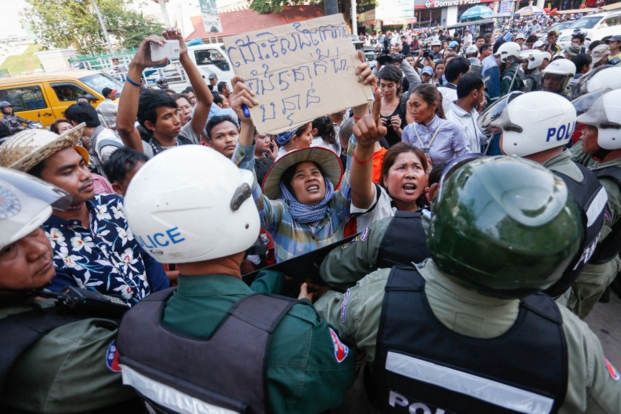U.N. official Sally Soen was charged in absentia as an accomplice after failing to present himself for questioning.
The four Adhoc officers—head of monitoring Ny Sokha, his deputies Nay Vanda and Yi Soksan, and senior investigator Lim Mony—were arrested along with NEC deputy secretary-general Ny Chakrya last week and accused of convincing Mr. Sokha’s alleged mistress to lie to authorities about the affair.
They were held over the weekend and repeatedly questioned by the Anti-Corruption Unit—which is leading the investigations into the sex scandal—as well as court prosecutors and finally judges on Monday.
Kea Sophal, a defense lawyer for Adhoc, said the organization’s four officers were charged on Monday with bribery of a witness, the same charge laid against opposition commune chief Seang Chet last week for promising $500 to the alleged mistress after the scandal broke.
“They were charged with Article 548 of the Criminal Code,” Ms. Sophal said. “The courts decided to send Ny Chakrya to P.J. prison and the Adhoc officials were sent to Prey Sar prison.”
Another Adhoc lawyer, Op Vibol, said he believed the bribery allegations stemmed from a sum of $204 that Adhoc said it gave the alleged mistress, Khom Chandaraty, while they were representing her—and while she was denying the affair. Ms. Chandaraty changed her story last month under questioning over accusations of prostitution, admitting to the affair.
“They charged them with bribery. It involves that money. But I cannot say anything specific right now because I just received a small amount of information,” Mr. Vibol said. “The court did not show any evidence against my clients yet. They just detained them.”
Suos Vityea Vandy, a spokesman for the court’s judges, confirmed the charges but declined to comment further. Ly Sophanna, a spokesman for the court’s prosecutors, confirmed that the five were sent to prison.
“The investigating judge decided to put them in pre-trial detention,” Mr. Sophanna said.
Mr. Soen and the five detained on Monday face between five and 10 years in prison if found guilty. Mr. Sophanna said he did not know whether a warrant would now be issued for the U.N. official’s arrest.
In a speech on Sunday, Prime Minister Hun Sen said Mr. Soen would not be protected by the immunity afforded to U.N. staff, appearing to argue that immunity only applies to senior U.N. officials.
National Police spokesman Kirth Chantharith said police were ready to arrest Mr. Soen if a warrant was issued, but that they would look into the validity of his immunity as a U.N. official before executing a warrant.
“The police are the ones who enforce the law. If we receive an arrest warrant, it is difficult for us to avoid: We enforce the law,” General Chantharith said. “If he has immunity, the National Police will not violate him.”
Wan-Hea Lee, country representative for the U.N.’s Office of the High Commissioner for Human Rights (OHCHR), said on Monday that she believed the legal document conferring the immunity spoke for itself.
“It is not within my authority to read the Convention on Privileges and Immunities of the UN in any other way than is written therein. UN officials have immunity from legal processes arising from their actions undertaken in the line of duty,” Mr. Lee said in an email.
“The UN has sent a formal response to this effect to the Royal Government, and we await a response.”
The U.S. Embassy said on Monday that it was worried by the charges laid against the Adhoc staff and Mr. Chakrya.
“The U.S. Embassy is deeply concerned by the charges filed today by the Phnom Penh Municipal Court and is monitoring these cases closely,” embassy spokesman Jay Raman said in an email.
E.U. Ambassador George Edgar also said the arrests concerned him and would be raised during a diplomatic meeting between E.U. officials and the Cambodian government this week.
“The current political situation, including recent actions in relation to opposition Members of Parliament and the detention of NGO officials, will be among the issues discussed at the EU-Cambodia Joint Committee,” Mr. Edgar said in an email.
“An environment in which political parties and civil society can operate freely is an essential foundation for credible elections whose results will command legitimacy.”
Adhoc president Thun Saray and NEC spokesman Hang Puthea could not be reached.
A statement released on Monday by 59 NGOs, including Licadho, the Cambodian Human Rights Action Committee and Cambodian Center for Human Rights, also condemned the arrests of the rights workers.
“The targeting of these individuals…is the latest escalation in a far-reaching government assault on civil society ahead of upcoming local and national elections, and is a clear reprisal for support provided by rights workers in a politically-sensitive case,” it said.
“The case is a farcical use of both the criminal justice system and state institutions as tools to intimidate, criminalise and punish the legitimate activities of human rights defenders and civil society,” it added.
Protesting outside the courthouse, 41-year-old activist monk Sim Sovandy said he believed it was clear that Mr. Hun Sen and the CPP were pulling strings behind the scenes in the recent investigations.
“I think nowadays, the court is the puppet of the government. There is only one person, and he can do everything, like arrest or put anyone in jail,” he said. “This court belongs to the party, not the people.”

